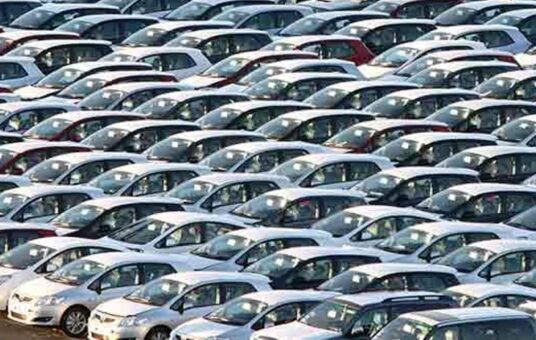KARACHI: The planned restrictions on automotive industry likely to increase the cost of motor vehicles and simultaneously to reduce the demand.
According to analysts of Topline Securities on Auto Sector, the government is planning to introduce measures to control rising import bill of the country by imposition of increased duties on luxury items including cars. The proposals according to news reports include increase in duties on import of Completely Built Unit (CBUs) and higher Federal Excise Duty (FED) on locally manufactured vehicles.
READ MORE: Pakistan’s car sales declines by 6% in October
The proposed measures under consideration include: 1) increase in regulatory duty (RD) on electric vehicles with 50 KWH battery pack from 10 per cent to 50 per cent, 2) increase in custom duty to 50 per cent from 15 per cent on Hybrid Vehicles on 1501-1800cc cars, 3) increase in FED from 5 per cent to 10 per cent on locally manufactured cars with engine capacity of 1500cc+.
The government has shelved the plan to impose ban on import of CBU and is likely to increase duties and taxes only to curtail rising import bill.
To recall, Pakistan total imports surged by 65 per cent to $25bn in first four months of fiscal year 2021-2022, which led to a current account deficit of $5.1 billion versus surplus of $1.3 billion in same period of the last fiscal year.
READ MORE: Ghandhara Nissan to launch Chery vehicles current fiscal
Pakistan total transport group imports surged by 140 per cent to $1.5bn in first four months of the current fiscal year exerting pressure on total import bill of the country.
It is pertinent to note that as per the Auto Policy of 2016-21, auto manufacturers were allowed to import 100 units of CBU for test marketing before they can start production of cars locally.
This led to sharp rise in CBU imports and there are news reports of potential misuse of the policy as few new entrants have imported more than 100 units.
READ MORE: Tax rates on motor vehicles during tax year 2022
As per said news reports, around 7000 units MG HS by MG Motors have been delivered to the buyers since November 2020 till date whereas it local production of cars just started recently in May 2021.
Similarly, import of other CBUs which includes Toyota Cross, Land Cruiser, Honda Accord etc have also led to higher import bill.
It will be interesting to see how the concerned authorities address the issue as the old auto policy expired in June 2021 and we still await for the new policy.
During the last fiscal year, used CBU imports clocked in at 21,247units whereas new CBU imports touched 6,394 units. The combined (old + new CBUs) contributed around 11 per cent of Pakistan car sales in the last fiscal year.
READ MORE: Indus Motors posts 195% growth in net profit to Rs5.42bn
The analysts said that latest numbers for the same are not available but looking at increased interest of new cars specially in the SUV segment we expect this number to be much higher in FY22.
They believe the decision to increase regulatory duty on CBUs will result in high car prices and may result in reduced demand for imported CBUs by new entrants. It may also force the new entrants to start manufacturing vehicles locally.
However, since the proposal to ban import completely is highly unlikely, the above stated measures are not likely be materially positive for local listed assemblers.
Additionally, expected increase in Federal Excise Duty (FED) to 10 per cent from 5 per cent on 1500+cc locally assembled cars and rising KIBOR (Karachi Interbank Foreign Exchange Rate) is likely to impact car demand going ahead.
READ MORE: SBP issues KIBOR rates on December 08, 2021
Stringent regulatory measures by SBP on auto financing and rising KIBOR is likely to impact car sales going ahead. It is important to note that, auto-financing on average contribute around 30-40 per cent of the total car sales of the industry. In November 2021, Pakistan car sales are anticipated to drop by 10 per cent MoM owing to the above stated measures.
The analysts expect Pakistan car sales to grow by 10 per cent in the ongoing fiscal year after a strong sales recovery in last fiscal year.
They have an ‘underweight’ stance on Pakistan Auto Sector based on the premise of 1) rising kibor, 2) stringent auto-financing policies, 3) increasing cost pressures, 4) likely increase in FED, and 5) expected macroeconomic slowdown.
